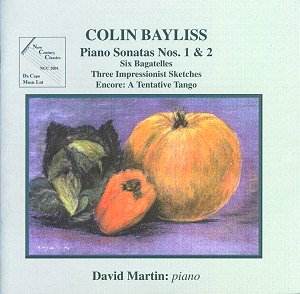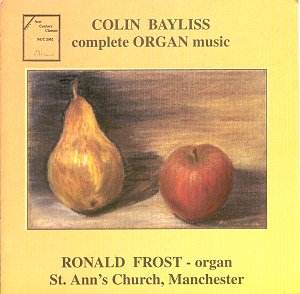Colin BAYLISS (b. 1948)
Piano Sonata No. 1 Benedictio Mariae (1982)
Piano Sonata No. 2 (1996)
Six Bagatelles (1981)
Three Impressionist Sketches (1981)
Encore - A Tentative Tango (1996)
 David Martin (piano)
David Martin (piano)
rec ASC studios, Macclesfield, 1998
 NEW CENTURY CLASSICS NCC
2001
NEW CENTURY CLASSICS NCC
2001

Compact disc is surely the ideal practical medium for becoming familiar with
music. Repeat listenings are there for the taking and, while it is undeniable
that the performance is stuck immutable like an insect in jet, beauties still
float freely, progressively released by listening again and again.
Colin Bayliss's name is little known. He is a British composer born in
Nottinghamshire and his profuse output has not been matched by a drive to
promote performances and recordings. Now, however, his Da Capo publishing
house is producing a series of CDs under the New Century Classics label and
this is the first. The second collects his organ music and is also reviewed
here.
The first sonata (also scored as his second string quartet) learns
lessons from Shostakovich's grotesquerie, Mussorgsky's gaucheness and French
impressionism. It is a work seemingly much taken with the fast ticking of
time-pieces. While not straightforwardly tonal it rejects despotic avant-garde
extremism. Think in terms of late Shostakovich. Fourteen years on and the
second sonata is both more introspective and more richly endowed with
a romance that touches base with Grieg and with Medtner. Into it is woven
material from Beethoven's Les Adieux sonata. The sharply rhythmic
central movement might at one moment make you think of Gershwin and at another
of Nikolai Kapustin. The Six Bagatelles are less equivocal
in their tonality and without being facile will appeal instantly. Bayliss
has a nice way with subtle tunes. The final Valse is redolent of the
waltzes in Prokofiev's Romeo and Juliet. The Three Impressionist
Sketches are contemporary with the first sonata and with the
Bagatelles though they are more involuted than the Bagatelles.
Thamesnight takes up where the middle movement of Beethoven's
Emperor left off. Jonathan Middleton has also recorded the
Sketches (A.S.C. CD CS CD1) so this is at least their second
recording on compact disc. The disc ends with a stately
Tango.
David Martin is a technically accomplished player who plays with the utmost
confidence. There is no faltering or lack of direction. Greater dynamic contrast
would have further aided the Bayliss case and David Martin is imperfectly
served by the instrument or acoustic which is clear but lacks resilient richness.
There is just that hint of wet pebbles about it. Your mind's ear translates
easily enough but a better instrument or venue would have aided listening
pleasure.
The cover of this disc and of the organ music CD are decorated with still
life oils by Rayna L Harris.
All of this makes me keen to hear the string quartets, and the four symphonies.
I heard a tape of his Baltic Dances (for orchestra) some time ago
and can assure you that Bayliss is a skilled and melodically gifted composer.
Rob Barnett
Colin BAYLISS (1948-)
The complete organ music
Prelude (1990)
Organ Sonata (1992)
Postlude (1992)
Funeral Music (1996)
Wedding Music (1971)
 Ronald Frost (organ)
Ronald Frost (organ)
St Ann's Church, Manchester, rec 1990s
 New Century Classics NCC
2002 [50.03]
New Century Classics NCC
2002 [50.03]

Colin Bayliss was born in Mansfield, Nottinghamshire and is a prolific composer.
His catalogue runs to 100 opus numbers with four symphonies, six string quartets
and five concertos. Da Capo music, founded by Bayliss in 1992, publishes
his works as well as the music of many other British composers. On the New
Century Classics label they are branching out into CDs. Bayliss's dedication
to the cause of music has also allowed time for catalogues of the music of
Peter Maxwell Davies and Anthony Hedges.
To the music: Both the Prelude and the Postlude sport Sibelian
apparel in a harmonically spicy Gallic 'sauce'. They are neatly sequenced
to flank the Sonata. The Sonata's ruminative Moderato is succeeded
by a fantastic allegro. The resplendent crunch and battery of harmonic collisions
are the stuff of which Bayliss's organ music is luxuriantly spun though not
in such profusion that textures become muddy. His inventive stock comes up
with a winner of a tune at 3.20 in the allegro - triumphant and yet
shambling and uncertain. The Postlude was, like the Sonata, written
for Joseph Nolan. It comes as no surprise to read that Bayliss thinks
orchestrally. So often in listening to this work orchestral instruments and
groupings are vividly suggested. Ronald Frost is a dextrous and sensitive
performer and Bayliss must be very well pleased with the results. At just
over 52 minutes this disc could perhaps be reissued in the future with yet
more (as yet unwritten) pieces by Bayliss.
Funeral Music was written on the occasion of the heart attack of the
composer's sister; thankfully she achieved a good recovery. It suggests the
great mysteries rather than grief though their is comfort in such
impersonalities. The Wedding Music had its genesis in Bayliss's first
wedding in 1971 and comprises arrangements of passages from Lohengrin
(lovely liquid playing) and Götterdämmerung.
Organists would do well to look closely at these fine works. They add lustre
to the repertoire.
Rob Barnett
_____________________________________________________
FUTURE BAYLISS DISCS:
The string quartets are being recorded by the Lochrian string quartet, who
have so far got numbers 3 and 6 in the can together with the violin and cello
duet Slovak Rhapsody. The Two Movements for String Trio is
scheduled next, together with the 5th quartet, leaving nos.1, 2 and 4 to
be recorded early next year.
_____________________________________________________
www.dacapomusic.co.uk
In case of difficulty:-
Orders (£12 per disc - £10 if you are a BMS member) can be placed
with
Da Capo Music Ltd
26 Stanway Road
Whitefield
Manchester M45 8EG
phone 0161 766 5950
e-mail: colin@dacapomusic.co.uk
COLIN BAYLISS by Philip Scowcroft

In an article for COMA (Contemporary Music-making for Amateurs), Colin Bayliss
wrote of the necessity of composers never to give up composing and to believe
entirely in what they were doing. The article was extensively quoted by the
Voluntary Arts Network Newsletter as an example to creative artists in all
fields. Colin's life is an example of living by his own words.
He was born on 15 February 1948 in Mansfield, Nottinghamshire and tells the
joke against himself that "you can tell that I was born in the back streets
of a mining village in D.H. Lawrence's Nottinghamshire by the silk bow ties
and the received pronunciation". His academic qualifications are a degree
in History and a post-graduate Diploma in Librarianship from London University,
but all his adult life he has written music, which has been an obsession
with him from his early teens.
Completely self-taught, he assimilated the techniques of the Baroque, Classical
and Romantic periods, producing some early derivative works which he swears
will never see the light of day. His very early efforts, before the age of
20, he destroyed. Although he has published some of the early derivative
pieces with slight revisions, he feels that his strength as a composer lies
in his having worked out a way to compose using serial technique in a manner
whereby he is able to produce melody from the note rows in a logical manner.
His view on strict 12-note composition is that there is nothing wrong with
12-tone music, except that most composers don't write it very well - the
worst being Schoenberg, Berg and Webern!
In spite of this somewhat cerebral approach to his own output, he has written
several pieces which may be regarded as eminently "accessible". Some pieces
like the Wind Trio of 1995, are both serial and accessible. Several piano
works such as the Six Bagatelles, Three Impressionist Sketches,
(due to appear on CD and depicting respectively a Kentish sunset, a firework
display on the Thames and a theatre Matinee), and Valentines, are
all written in a straightforward tonal style, as are his "Iron Curtain"
folkdance-based orchestral pieces, the chamber symphony Children of
Prague, dedicated to the Czech freedom rights movement, Charter 77, and
the three suites: Baltic Dances (first performed on the day after
the fall of the Berlin Wall), For Romanis (composed in three days
whilst observing the downfall of the Ceaucescu regime on the television)
and Costumes: Dances from Poland which may be reckoned as "light"
music in the best British tradition.
Other large-scale works include two operas and three other symphonies; one,
Romantic, is another deliberately unpublished work written in his
thirties to overcome a creative block and he describes it as "the last Romantic
symphony - something to make Sibelius's 2nd sound tuneless." His other symphonies
are Vinlandsaga - A Nordic Symphony (on the discovery of America by
the Vikings) and Ecocycle, a setting of ecological poems for two sopranos
and orchestra. To date he has written four string quartets, the fourth a
13-movement piece synthesising 12-tone and tonal-sounding music, and a large
amount of other chamber music, including two piano sonatas.
As well as composing, he has been responsible for producing annotated catalogues
of the music of Anthony Hedges and Sir Peter Maxwell Davies. The first of
these books was the first composer's catalogue ever to be produced in Britain
by a local authority (Humberside) and the first to be available on floppy
disc if required. As a result of this task for other composers, he began
a catalogue of his own complete output, and the result, "The Music of Colin
Bayliss - the First 100 Works", appeared in 1998 for his 50th birthday.
Philip Scowcroft
Crotchet AmazonUK
AmazonUS

